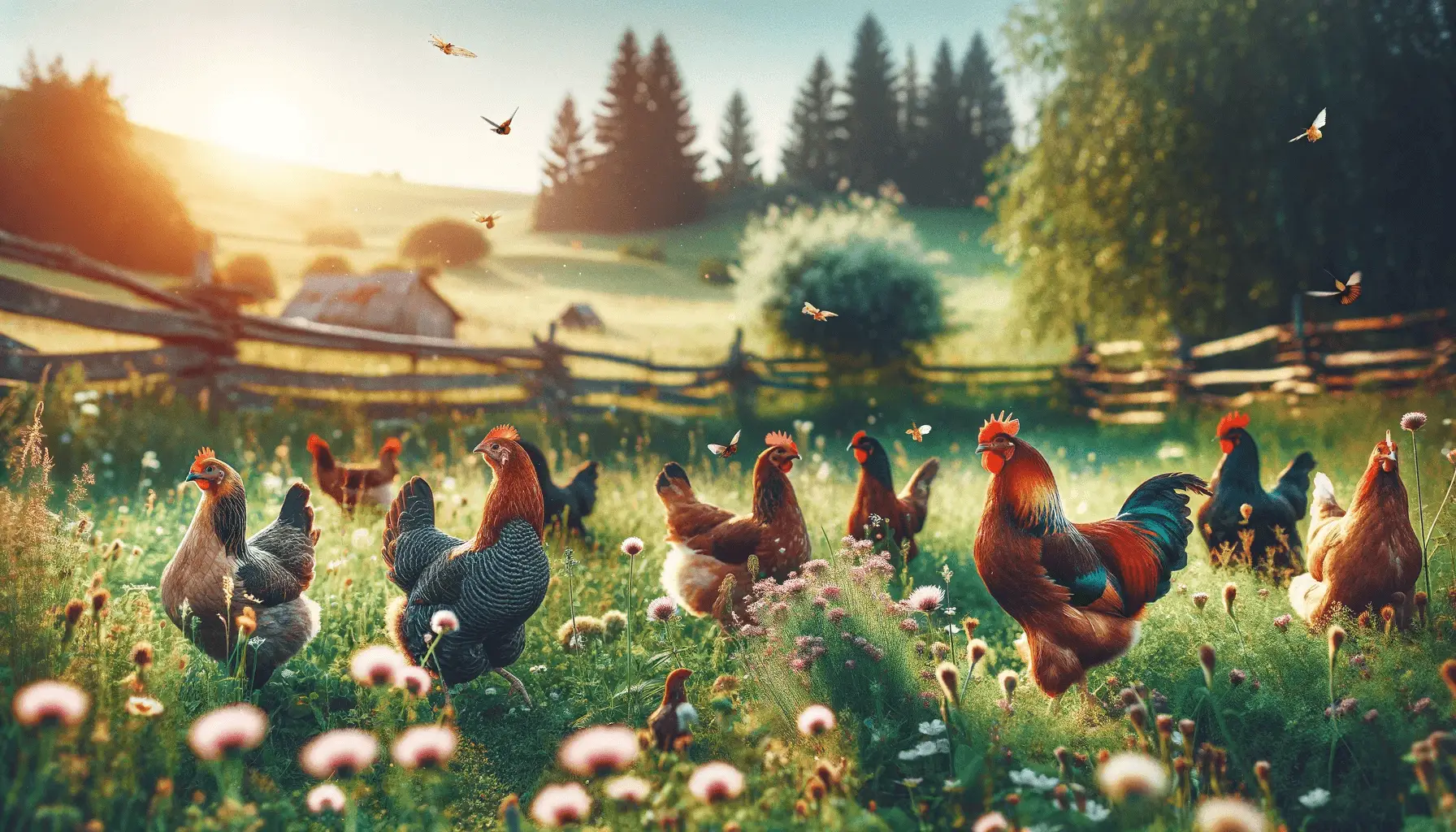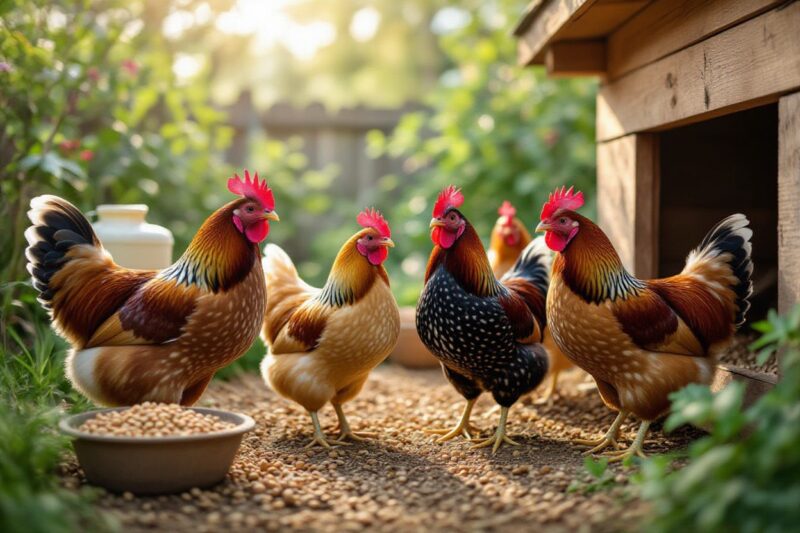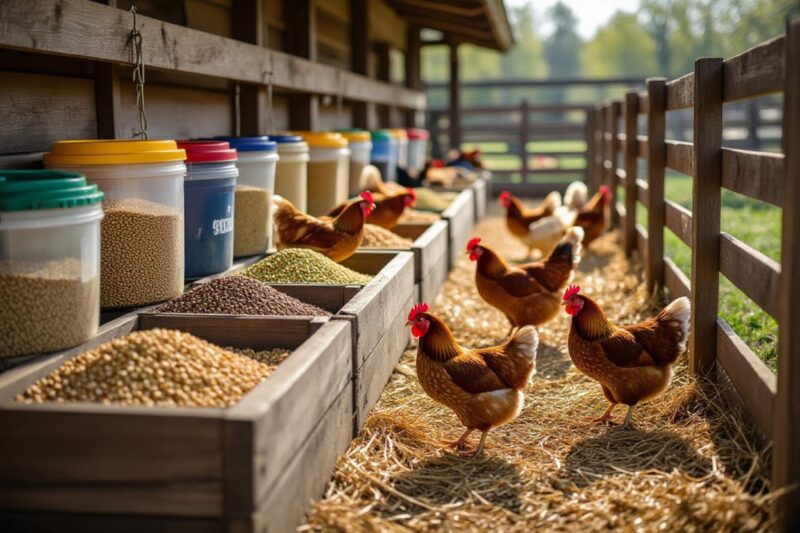Keeping hefty chicken breeds can be a rewarding experience for poultry enthusiasts. These hefty hens not only provide a substantial amount of meat, but they also add a majestic presence to your flock.
Raising weighty chicken breeds does come with its challenges.
These birds are prone to health issues, particularly related to their size and weight.
Therefore, it is crucial to provide proper care and management to ensure their well-being.
Despite the challenges associated with heavy chicken breeds, they continue to be a popular choice for those looking to raise their own poultry.
The benefits of raising such substantial chicken breeds include their impressive meat production and aesthetic appeal
Characteristics of Large Chicken Breeds
Large chicken breeds are beloved for their grand size and stature, making them a popular choice for both meat production and visual appeal, especially big fowl and heavyweight chickens. One key characteristic of these big fowl is their impressive size, with some weighing 10 pounds or more, which makes them perfect for meat production.
These heavyweight chickens are sturdy and resilient, enabling them to thrive in various climates and conditions, making them well-suited for free-range or backyard farming.
In addition to their size, they also boast broad chests, thick legs, and some breeds even exhibit unique feather patterns or colors, further enhancing their visual appeal.
When selecting a large chicken breed, it is crucial to consider your specific needs, as well as the space and resources necessary to accommodate their size and dietary requirements. Large chicken breeds offer a distinctive combination of size, strength, and captivating appearance
Choosing the Right Breed for Heavy Roosters
When choosing the perfect breed for heavy roosters, it is important to consider their intended purpose and the environment in which they will be raised, whether you opt for mammoth, jumbo, or massive chickens. If you are looking to raise roosters for meat production, popular choices include mammoth chickens or jumbo chickens such as the Cornish Cross or Jersey Giant.
These chickens are specifically bred for their meat production capabilities, making them ideal for farmers who want to maximize their yield.
On the other hand, if you are seeking robust chickens with ornamental value, breeds like the Brahma or Cochin are excellent options.
These chickens are known for their impressive size and stunning plumage, adding aesthetic appeal to any flock
| Breed | Intended Purpose | Meat Production Capability | Ornamental Value |
|---|---|---|---|
| Mammoth Chickens | Heavy roosters | High | Low |
| Jumbo Chickens (Cornish Cross or Jersey Giant) | Heavy roosters | High | Low |
| Brahma | Heavy roosters | Low | High |
| Cochin | Heavy roosters | Low | High |
Popularity of Substantial Hens among Poultry Farmers
Stocky chickens have become increasingly popular among poultry farmers due to their unique characteristics and benefits. These strong and powerful chickens are known for their robust build and substantial weight, making them an ideal choice for meat production.
With their thickset and broad bodies, these hens offer a higher yield of meat, which allows farmers to maximize their profits.
These muscular chickens have a rapid growth rate, allowing them to reach their market weight in a shorter time frame.
This efficiency makes them highly desirable for production cycles, enabling farmers to raise and sell more chickens in a shorter amount of time.
One of the reasons for the popularity of these hens is the excellent quality of their meat.
The meat from these stout and stocky chickens is tender, juicy, and flavorful, satisfying the demands of consumers who seek high-quality poultry. These chickens are known for their broad and muscular build.
Advantages of Raising Big Poultry Breeds
When it comes to raising big poultry breeds, farmers and backyard chicken enthusiasts can enjoy numerous advantages such as rearing chunky chickens, beefy chickens, or plump chickens that are incredibly satisfying to nurture. These chickens have a robust build and substantial weight as they are specially bred for exceptional meat production.
The meat quality of these chickens is superior, with more muscle mass and less fat.
As a result, the meat is tender and flavorful, making it highly sought after in the market.
These plump chickens offer a higher meat yield, allowing farmers to maximize their profits and reduce the number of chickens needed for meat production. These chickens also have an efficient feed conversion rate, requiring less feed to produce the same amount of meat.
Therefore, they are cost-effective to raise. For those looking to start a commercial chicken farming operation, raising these large chickens is an ideal choice due to their size and fast growth rate, which maximize production efficiency. Although primarily raised for meat purposes, keep these corpulent chickens well-fed and healthy.
Tips for Maintaining Health of Heavyweight Chickens
When it comes to keeping your heavy chicken breeds healthy, there are a few key factors to consider, especially for the big-breed chickens. These larger chicken breeds, known for their meat production, require special care and attention to ensure their overall well-being and productivity.
We will explore some important tips for maintaining the health of these meat chicken breeds and keeping them in optimal condition
Role of Solid Hens in Sustainable Farming Practices
Gigantic hens contribute to the economic viability of sustainable farming. Due to their larger size, solid hens yield a higher amount of meat per bird compared to smaller breeds.
This means that farmers can produce more meat with fewer birds, maximizing their profits and minimizing their expenses.
Another advantage of solid hens is their longer lifespan.
These heavy breeds are known for their slower growth rate, which allows them to live longer and continue producing meat for a longer period of time. This reduces the need to constantly hatch new chicks and raise them to maturity, saving time and resources for farmers.
Solid hens, also known as heavyweight hens, offer numerous benefits to sustainable farming practices. Their efficient feed conversion, hardiness, adaptability, and larger meat yield make them valuable assets for farmers looking to minimize resource consumption, reduce environmental impact, and maximize profits. By incorporating robust hens, the farmer was able to enhance the overall strength and size of his poultry flock.
Benefits of Solid Hens in Sustainable Farming
- Higher meat yield: Solid hens, due to their larger size, produce a higher amount of meat per bird compared to smaller breeds. This allows farmers to maximize their profits and minimize expenses by producing more meat with fewer birds.
- Longer lifespan: Solid hens have a slower growth rate, which enables them to live longer and continue producing meat for a longer period of time. This reduces the need for constant hatching of new chicks and saves time and resources for farmers.
- Efficient feed conversion: Solid hens are known for their efficient conversion of feed into meat. This means they require less feed to produce the same amount of meat, making them cost-effective for farmers.
- Enhanced flock strength and size: By incorporating robust hens, farmers can enhance the overall strength and size of their poultry flock. This contributes to the economic viability of sustainable farming practices.
Identifying Common Issues in Robust Chicken Breeds
Chickens or even humans can be overpowered by the sturdy hens’ sheer strength. It is important for owners to provide adequate space and proper socialization to prevent aggressive behavior from developing or escalating.
Providing enrichment activities and outlets for natural behaviors can help to keep these robust hens engaged and prevent boredom, which can also contribute to aggressive tendencies.
When considering heavy chicken breeds, it is crucial to ensure that owners have the appropriate housing and infrastructure to accommodate their size and weight.
These breeds often require sturdy and spacious coops and runs, as well as secure fencing to prevent escape or entry by predators. Providing ample perches and nesting boxes is also important, as these hens may have difficulty flying or accessing higher areas.
Overall, while heavy chicken breeds can be a rewarding addition to a backyard flock, it is important for owners to be aware of and prepared for the unique challenges that come with these robust hens. By harnessing the strength of those powerful hens, the farm was able to thrive and flourish.
Significance of Muscular Roosters in Breeding Programs
Muscular roosters play a crucial role in breeding programs with stout hens. They possess exceptional genetic traits and physical attributes, making them ideal candidates for improving the meat quality and size of chicken breeds.
Their robust musculature leads to increased meat yield and enhanced meat texture, which are highly valued in the poultry industry.
These roosters have the unique ability to pass on their desirable traits to their offspring through selective breeding, resulting in a more muscular and meatier flock.
Their superior reproductive capabilities ensure a successful breeding process, especially when the goal is to efficiently produce a large number of meat chickens.
The strong muscles of these roosters contribute to the overall health and vigor of the flock.
This helps reduce the risk of injuries and promotes the well-being of the chickens. To optimize the breeding program’s success, breeders should focus on selecting muscular roosters with stout hens as their mates.
Muscular Roosters in Breeding Programs
- Muscular roosters possess exceptional genetic traits and physical attributes, making them ideal candidates for improving the meat quality and size of chicken breeds.
- The robust musculature of these roosters leads to increased meat yield and enhanced meat texture, which are highly valued in the poultry industry.
- These roosters have the unique ability to pass on their desirable traits to their offspring through selective breeding, resulting in a more muscular and meatier flock.
- By selecting muscular roosters with stout hens as their mates, breeders can optimize the breeding program’s success and efficiently produce a large number of meat chickens.
The Best Chicken Breeds in Kenya
The Best Chicken Breeds for Meat Discover Top Picks for Succulent Flavorful Results
The Best Chicken Breeds in Kenya
The Best Chicken Breeds for Meat Discover Top Picks for Succulent Flavorful Results





